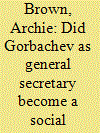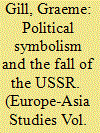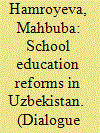| Srl | Item |
| 1 |
ID:
118433


|
|
|
|
|
| Publication |
2013.
|
| Summary/Abstract |
As General Secretary, Gorbachev evolved from a Communist reformer to a socialist of the social democratic type. The most important programmatic documents of the CPSU in 1990-1991, on which Gorbachev had the predominant influence, were essentially social democratic. (Many in the Party apparatus had no intention of implementing them.) From 1988, Gorbachev was advocating fundamental change of the Soviet system, although there were zig-zags in his public pronouncements under the pressure of events. Ill-understood both at home and abroad, Gorbachev's social democratic ideas were 'outflanked' by the market fundamentalism and political impatience of his radical opponents and frustrated by the implacable enmity of conservative defenders of the vanishing Communist party-state.
|
|
|
|
|
|
|
|
|
|
|
|
|
|
|
|
| 2 |
ID:
118435


|
|
|
|
|
| Publication |
2013.
|
| Summary/Abstract |
When Gorbachev came to power he inherited not simply a system in crisis, but a structure of symbols that was embedded within the broader political system and which was also in crisis. Given the ideocratic nature of the Soviet system, any change to that system would require symbolic change as well. This essay charts how Gorbachev sought to come to grips with this problem, investing some symbols with new meaning while rejecting others. It shows how ultimately he was unable to produce a new, coherent narrative.
|
|
|
|
|
|
|
|
|
|
|
|
|
|
|
|
| 3 |
ID:
129423


|
|
|
|
|
| Publication |
2014.
|
| Summary/Abstract |
After gaining independence, Uzbekistan created favourable conditions for development of education. Legal framework for working out a national education policy was the imperative of the day. Only on the
basis of a strong cadre policy could the country look forward to development and choose its own path. Adoption of the Constitution of the Republic of Uzbekistan was the first step in this direction that guaranteed all citizens the right to education. It provided that the State shall guarantee free secondary education to all children. Schooling is under the State control.1 Subsequent reforms were undertaken in a
phased manner and these reforms have helped in improving the structure and content of education. This paper deals exclusively with the school education at a time when the country transited from decadent Soviet system to a new system of school education.
|
|
|
|
|
|
|
|
|
|
|
|
|
|
|
|